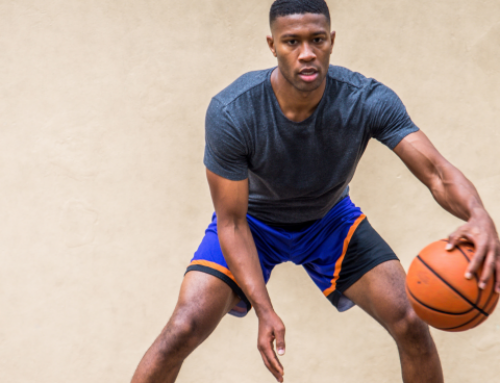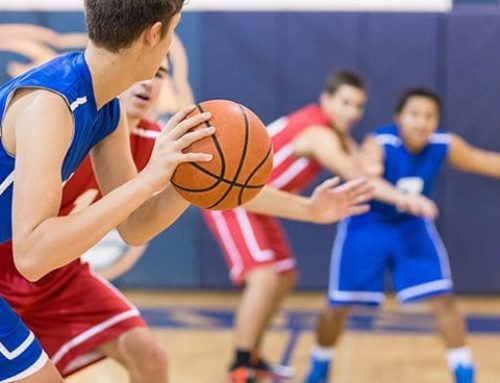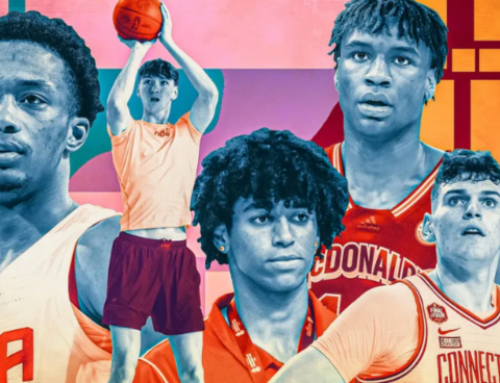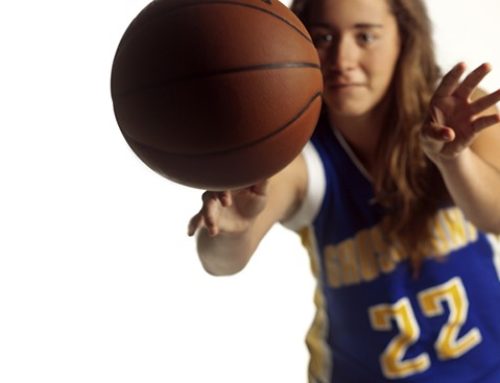Jay Williams Completes the Crossover
During a preseason visit with coach Tom Crean and the Indiana men’s basketball team, Jay Williams asked a group of Hoosiers how many shots they attempt per day outside of team practice. The general consensus among the players was between 100 and 200 shots a day.
Williams, the former Duke standout and current ESPN college basketball analyst, was shocked by their response.
“For me, I would try to get up 500 makes. Not 500 shots, 500 makes,” Williams says. “That may have been 700, 800 shots before I got 500 makes, but it was that kind of mentality that allowed me to be successful, not only in basketball, but in life.”

Jay Williams was named college basketball’s player of the year after leading Duke to the 2001 NCAA national title.
By the end of his senior year, Williams was the player getting the accolades. He was the New Jersey Player of the Year and was named to the Parade, USA Today and McDonald’s All-American teams. Three years later, he had transformed from under-the-radar prospect to the best college basketball player in the country as the point guard for the 2001 NCAA champion Duke Blue Devils.
The sky was the limit for Williams, and he was selected second overall by the Chicago Bulls in the 2002 NBA Draft. He had not only achieved his dream of playing in the NBA, he got to play with the team he had idolized as a youngster. And with Michael Jordan no longer at the throne, Williams could be “the man” in Chi-Town.
But it all came crashing down after a motorcycle accident nearly claimed Williams’ life following his rookie season. He sustained multiple injuries, and it was feared that his left leg would have to be amputated.
Says Williams, “I went through a long period of time when I was angry and frustrated at myself. To go from being drafted with the No. 2 pick for a team you always wanted to play for and being on a billboard going down I-90 into Chicago, to being in a hospital bed and worrying that you may never be able to walk again, that’s a humbling experience.”
Determined to return to the NBA, Williams embarked on an exhaustive rehab program nearly a year and a half after the accident. Then, however, he began questioning his motivation to make a comeback. He says, “I spent so much time trying to chase this dream, but I felt like I was chasing it because that was all I had known from my past, and also because everyone had expected me to chase it.”
Williams’ decision to quit the game and pursue a career in broadcasting is the inspiration behind his new interview series, The Crossover with Jay Williams, which debuted this past August on Sirius XM Radio. Says the former Bull, “There’s a basketball relation with the crossover, going right to left—which was one of my favorite moves—but also having the ability to adapt to and change to your environment.”
The concept for The Crossover, according to Williams, is to interview leaders in the sports and entertainment industry to help young people learn what it takes to build and execute a plan for achieving success in their lives.
He says the show should be especially beneficial to student-athletes: “They need to understand how fortunate they are to have this platform by playing high school and collegiate sports, that they can leverage that opportunity as much as possible for future success.”
Williams is living proof of the message he’s promoting.
Photo: ABC News
RECOMMENDED FOR YOU
MOST POPULAR
Jay Williams Completes the Crossover
During a preseason visit with coach Tom Crean and the Indiana men’s basketball team, Jay Williams asked a group of Hoosiers how many shots they attempt per day outside of team practice. The general consensus among the players was between 100 and 200 shots a day.
Williams, the former Duke standout and current ESPN college basketball analyst, was shocked by their response.
“For me, I would try to get up 500 makes. Not 500 shots, 500 makes,” Williams says. “That may have been 700, 800 shots before I got 500 makes, but it was that kind of mentality that allowed me to be successful, not only in basketball, but in life.”

Jay Williams was named college basketball’s player of the year after leading Duke to the 2001 NCAA national title.
By the end of his senior year, Williams was the player getting the accolades. He was the New Jersey Player of the Year and was named to the Parade, USA Today and McDonald’s All-American teams. Three years later, he had transformed from under-the-radar prospect to the best college basketball player in the country as the point guard for the 2001 NCAA champion Duke Blue Devils.
The sky was the limit for Williams, and he was selected second overall by the Chicago Bulls in the 2002 NBA Draft. He had not only achieved his dream of playing in the NBA, he got to play with the team he had idolized as a youngster. And with Michael Jordan no longer at the throne, Williams could be “the man” in Chi-Town.
But it all came crashing down after a motorcycle accident nearly claimed Williams’ life following his rookie season. He sustained multiple injuries, and it was feared that his left leg would have to be amputated.
Says Williams, “I went through a long period of time when I was angry and frustrated at myself. To go from being drafted with the No. 2 pick for a team you always wanted to play for and being on a billboard going down I-90 into Chicago, to being in a hospital bed and worrying that you may never be able to walk again, that’s a humbling experience.”
Determined to return to the NBA, Williams embarked on an exhaustive rehab program nearly a year and a half after the accident. Then, however, he began questioning his motivation to make a comeback. He says, “I spent so much time trying to chase this dream, but I felt like I was chasing it because that was all I had known from my past, and also because everyone had expected me to chase it.”
Williams’ decision to quit the game and pursue a career in broadcasting is the inspiration behind his new interview series, The Crossover with Jay Williams, which debuted this past August on Sirius XM Radio. Says the former Bull, “There’s a basketball relation with the crossover, going right to left—which was one of my favorite moves—but also having the ability to adapt to and change to your environment.”
The concept for The Crossover, according to Williams, is to interview leaders in the sports and entertainment industry to help young people learn what it takes to build and execute a plan for achieving success in their lives.
He says the show should be especially beneficial to student-athletes: “They need to understand how fortunate they are to have this platform by playing high school and collegiate sports, that they can leverage that opportunity as much as possible for future success.”
Williams is living proof of the message he’s promoting.
Photo: ABC News











